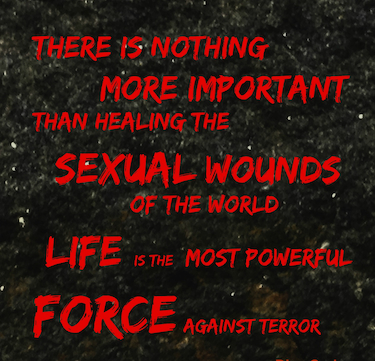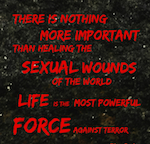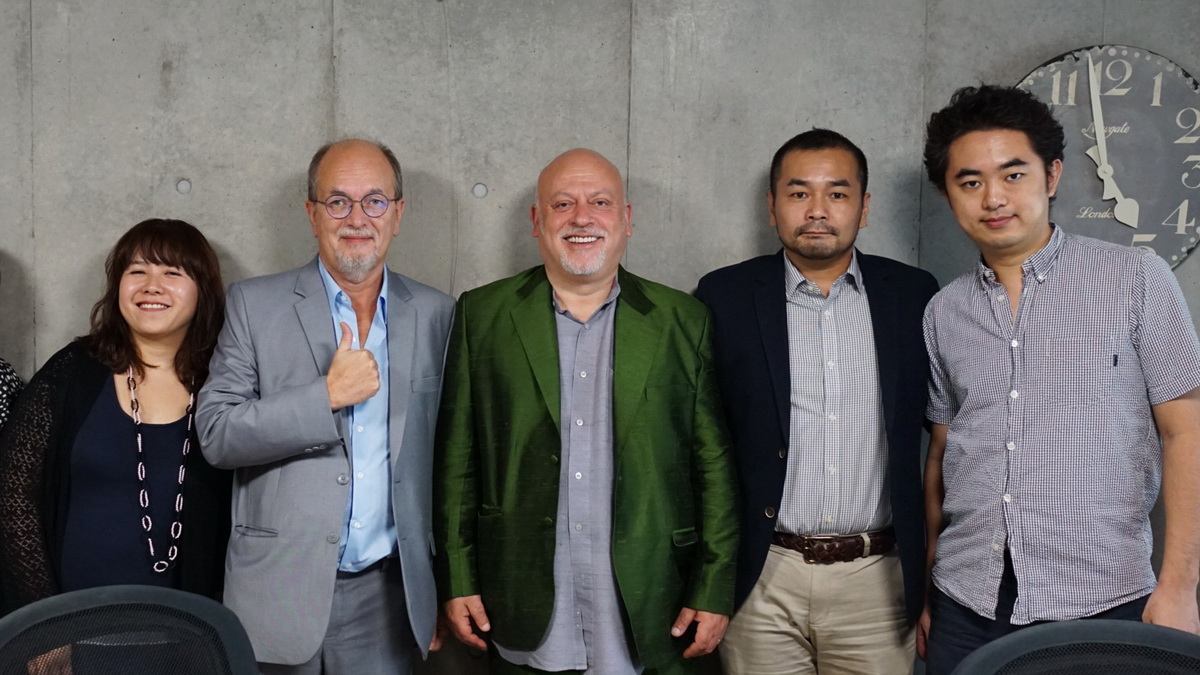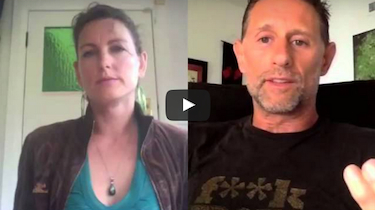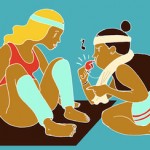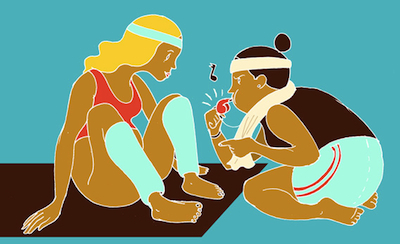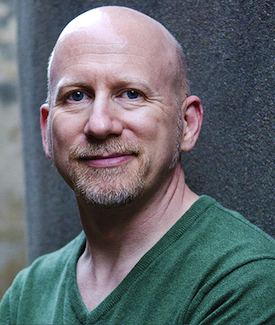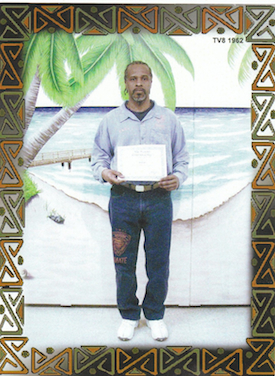This week’s relationship-themed guest-post comes from Christina Louise Dietrich, whom we’ve featured a few times in the last year or so. She writes about her healing journey at her own blog. — Amanda P.
By Christina Louise Dietrich
I am now 44 years old. I am a mother and a head of household. I am past the age where people used to be generally considered “over the hill.” From a transition standpoint, this is significant for me personally because there’s only one generation remaining between me and mortality: the generation of my mother and her siblings. My next big generational shift will be to matriarch/crone. My mother’s will be to death.

Christina Louise Dietrich
My mother’s death isn’t imminent, but it is inevitable, and even though only in her early 60’s she has had a fair share of medical scares. Cancer. Stroke. Falls with broken bones. A choking incident that brought her dangerously close to asphyxiating if it hadn’t been for my stepfather finding and resuscitating her. All these events remind me of her mortality by keeping it in the peripheral vision of my mind’s eye. Watching. Waiting for each of us to advance another rung on the generational ladder.
On Day of the Dead, I set up an altar to the matriarchs in my family; I put my attention on my maternal great-grandmother, my maternal grandmother, and my mother. I’ve spent a lot of time in therapy the last four years talking about these women and the not-insignificant effects they had not only on me but each another. As an ancestral line, I can clearly see the traits handed down to me courtesy of them, some of which include strength, anxiety, determination, a high need for control, frugality, tenacity, and a deep sense of familial duty/sacrifice/obligation.
The altar is still intact and I continue to feel their presence, hear their voices. Even more strongly now than before—I think, because I’m calling out for their support and wisdom. Because I can feel myself beginning to prepare energetically and psychically for the death of my mother. Even if it’s only theoretical at this stage, as a planner who is finely attuned to transitions, doorways, and liminal spaces it’s a transformation that’s especially potent for me during this season of darkening.
What I’m feeling into right now is how the process of her dying will change the dynamic of our relatedness; how she will take on more child-like qualities and I will assume the more parental role. I see the possibility for me to support her more in the coming years; to take the skills I’ve learned through parenting Avery and re-parenting myself, and leveraging those to hold a more compassionate, patient space for her. After all, she has a high need for control just like I do and as she loses control over more of her self, I anticipate the need for a lot of patience on my end.
As if sitting with the impending death of my mother weren’t intense enough, it’s also bringing up older, deeper body memories for me. Because this isn’t the first time she and I have danced with power dynamics and leaned on one another for support.
Embodying the Masculine as a Girl Child
When I was 5 years old, my mother and I (and my 3-year-old sister) were in a pretty shitty situation. My sexually, physically, and emotionally abusive biological father had just left us for the last time because my mother stood up to him, and told him to get out and never come back. An act of strength and courage I have since thanked her for many times. An act that while freeing us from him, also left us in a position of needing to depend on one another more directly, more concretely.
Like many women who had been trapped by domestic abuse, she was literally at rock bottom; overwhelmed, exhausted, deeply wounded, and also needing to care for two small children. Even with the local support of her parents and brothers, it was still really hard at home. She needed me to be her “big girl,” to be strong and help her with baby Theresa when she got overwhelmed. She needed me to carry a lot more emotional and psychic weight than was appropriate given my age and equally vulnerable position.
I was naturally precocious in the ways of care-taking and helping; I was a sensitive, empathetic, deeply-feeling child from a long line of caretakers and emotional baggage handlers. And so, when my mother needed someone to be strong for her, someone she could count on to always be there and love her, I became a source of support, reliability, and certainty for her in a world that seemed bent on hurting her. She could talk to me, share her feelings, and cry about how much it hurt. She could count on me to be relatively independent, capable, and self reliant.
I believe that I embodied the masculine to protect her from falling deeper into dysfunction, to protect my primary source of security, safety, and love. And yet none of it could be acknowledged as such; it was an unconscious resonance between us. She wasn’t consciously awake enough to recognize what was happening and I was a little girl desperate to ensure Mommy wouldn’t abandon or stop loving me.
And so, in a sense, we became psychically married, she and I. Co-dependent. Enmeshed. Tied together because of the wounds the patriarchy and my father inflicted, and we jointly had to recover from. As a result, I have always felt responsible for her well-being; responsible to be a sturdy framework against which she could drape her tired, bruised limbs and cry.
Being Told to Put on the Girl Suit
At the same time, despite how masculine and grown-up I felt in the relationship with my mother, I was obviously in the body of a young girl. I knew I was a girl and I’ve never felt any confusion or disgust about that fact; it’s just that I’ve never been comfortable or confident in my ability to perform femininity. The world was telling me to put on the pink suit and its myriad complicated accouterments, but at home I was clearly wearing something that approximated the blue suit, at least in function. Thus began my internal dissonance around gender and society’s expectations in regard to it.
As a cis-female born in 1971 America and raised by a traditionally-valued family, I’ve been handed a lot of narrowly-defined programming about how I’m supposed to look, what I’m allowed to do, and how I should conduct myself. As an androgynous, 6-foot-tall, anxious, suspicious woman with an advanced case of “Resting Bitch Face,” I’ve had a damn hard time manifesting those programs in ways that convince people.
Aside from the fact I live in a rape culture as a second-class citizen—which means I’ve been raped, get paid less than my male co-workers, and still have a hard time getting people to take me seriously—living in a female body has been pretty cool. I actually like being a woman, especially now that I’m in my 40’s. What I find so distasteful is trying to embody and perform femininity. Lace. Mini skirts. High heels. Makeup. Push-up bras. Smooth legs. An hourglass hip-to-waist ratio. An inviting smile. A willingness to be told what to think.
I worked hard to adopt the mannerisms and affectations of Society’s Desirable Feminine, or at least someone whose appearance shouted I’M READY TO GET FUCKED, which is essentially the same thing. These attributes and the dogged pursuit of them are what I hate about the mainstream definition of culturally-acceptable femininity. Because every single one of them is about oppression. Getting smaller. More contained. More malleable. Hobbled. Agreeable. Compliant. Tortured. Objectified.
What about the Christina suit? It’s contains an entire spectrum of colors and would allow me fluid movement. Does anyone want to see me wearing it? No?
Finding my Authentic Orgasmic Rhythm
One of the things they don’t tell you straight-away about performing femininity is the fact it’s arbitrary, often conflicting, and designed to keep you off balance. Embarrassed. Competitive. Ashamed. Inadequate. Because horizontal violence and oppression. For example, let’s look at the female orgasm.
Over the last few months I’ve discovered that my body doesn’t want to climax every time Brendan and I have sex. She actually prefers to do so every 2-3 times; a rhythm that allows Her to be literally fed by both our combined sexual energy and His semen. She wants to hold that energy inside her and use it to fuel all manner of erotic undertakings like blogging, cooking, and remembering how amazing it is to live inside this beautiful body. To fuel the remembering that Her pleasure is worth building and worth waiting for.
I’m standing in the shower one morning, seeing the truth of this newly-discovered rhythm, and wondering why it feels so revolutionary. I asked my body, “Body, why do you feel so amazed, relieved, and empowered to have discovered this?” The answer came, “Because I’ve been expected to have an orgasm every time we have sex.” Oh. Why? Because that’s a crucial part of performing femininity. According to popular media/porn, we all “know” when a woman has an orgasm because she’s loud and makes a big deal out of it, yelling and flailing around because the pleasure is just so epic.
The pleasure that the man is generating with his amazing, big, fat cock. OBVIOUSLY. So, once she has been thoroughly pleasured, that’s his signal—the sign that he’s “done a good job,” that he’s “earned” his release. That he can now cum, secure in the fact his penis is desirable, he’s an amazing lover, and he is worthy of further love and attention. His ego is intact. For the time being.
As the woman, what if I can’t or don’t want to have an orgasm? Well, now I’m coming dangerously close to bruising, crushing, or invalidating his ego and suffering the consequences. Because there will certainly be consequences and I’m the one who gets to clean up the emotional/psychological fallout. In this construct, preserving/protecting the male ego is MY responsibility and ensuring that ego feels secure all hinges on my ability to perform a convincing orgasm. Every time. Or else.
That’s a lot of pressure and my body has decades of it tamped down inside. Like I said, I’ve never been confident in my ability to perform femininity convincingly enough to ensure my safety.
Fortunately for me, I now have a partner whose aware of all that programming; both sides of it. He knows exactly what it’s like to have a fragile masculine ego that depends on near-constant feminine reassurance for its survival. And because he’s also committed to deep, bilateral healing in our relationship, he has given me a lot of space, time, and reassurance to find my rhythm. He doesn’t ask me to perform feminine sexuality for him unless I choose to do so. He wants to see pure, unadulterated, androgynous Christina and to discover what kind of sex SHE wants. What a fucking relief!
Loving Her as Loving Myself
So, my mother is going to die and with her will go the physical connection that my masculine has to her. How do I want to experience her in the time we have left? Over the years I have shared with her some of my childhood experience; how I’ve felt wounded by her inadequacies, how I’ve felt oppressed by and responsible for her pain, how it felt to be her daughter. Those were anxious, gut-churning encounters for me because holding up a mirror so my mother can see how she inadvertently wounded me took a lot of courage for me to do and for her to look.
It also hurt her. Because she knows she wasn’t the mother we both needed her to be. She couldn’t be. This world ensured she was broken by the time I came into her life. And I no longer feel the need to punish her for that, to try and get her to take responsibility for all the ways she let me down. For the ways she leaned on, squished, and controlled me. If she had the skill to be more respectful, validating, and supportive she would have been. I believe that with all that I am.
I’m a mother; I know how hard it is. And because we both know, it feels like I can now begin the final stages of individuating from her and claim my full identity. Every time I share space with her, feel her love for me, and feel my love for her, I can also step away from her with compassion, with respect. I can complete the process that allows me to transition past, through and with her.
Christina Louise Dietrich, a technical writer by trade, says of herself: “I write because I am claiming the voice my family and my society tried to silence, the voice that was my divine birthright. I am a woman, a mother, a feminist, a wife. I am compassionate, judgmental, loving, a bully, empathetic, obstinate, caring, rigid, and creative. I’m passionate about systems, beauty, process, experience, trees, interconnections, transitions, logistics, balance, and clarity. I manifest the Amazon, the Androgyne, and the Mother-to-be-Crone.”
